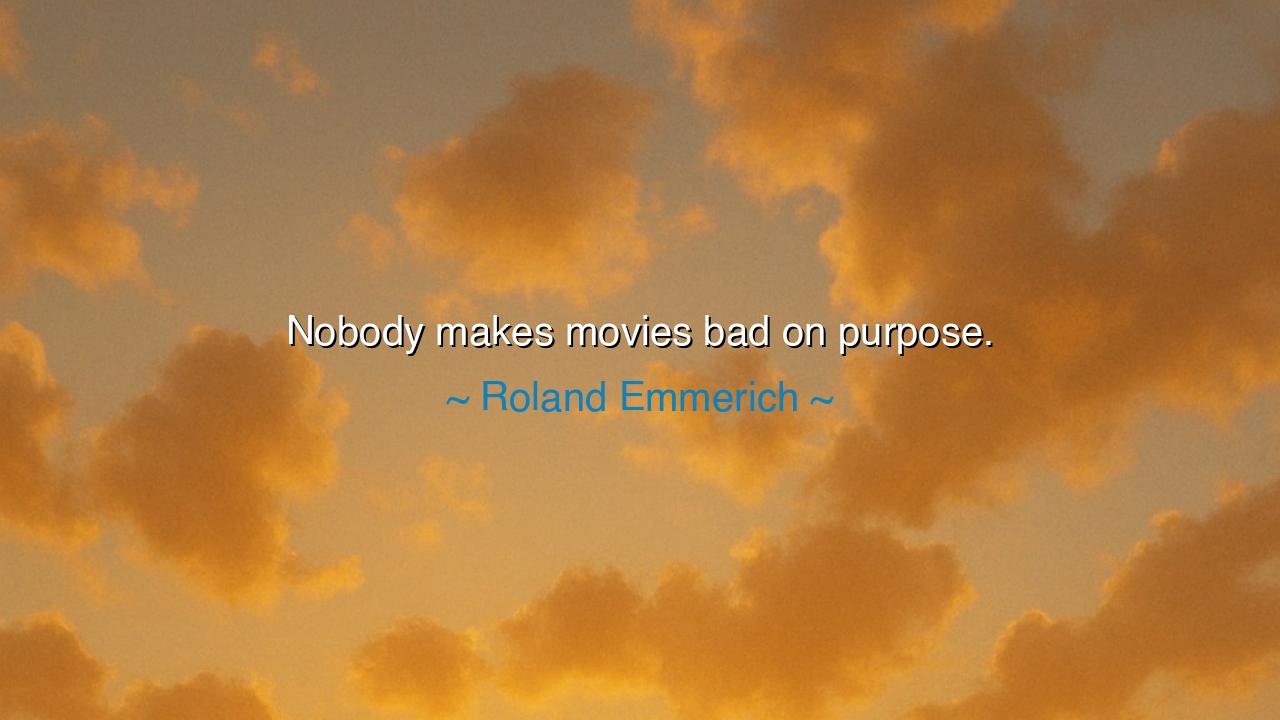
Nobody makes movies bad on purpose.






Hear the humble yet profound words of Roland Emmerich, craftsman of spectacle and teller of vast cinematic tales: “Nobody makes movies bad on purpose.” Though the saying is brief, it carries the weight of compassion for all who labor in the arts. For it reminds us that behind every film, even the ones mocked or dismissed, stand countless souls—writers, actors, builders, dreamers—who strove with earnest hands to create something of meaning. If the work fails, it fails not from malice, but from the frailty that accompanies all human endeavor.
The meaning of this saying lies in the nature of creation itself. To make a film is to embark upon a journey filled with uncertainty. Thousands of choices must be made: how to tell the story, how to shape the image, how to balance vision against cost. No one enters this process with the desire to birth failure. All come with hope, with energy, with belief in what they are making. Yet sometimes, despite this, the result falters. A film may be burdened by flawed writing, uneven acting, or the weight of circumstance. Still, even in failure, it bears the mark of sincere effort.
History proves this truth. Consider the tale of Ed Wood, often called the maker of the “worst films” ever created. His Plan 9 from Outer Space has been ridiculed for decades, yet Wood himself approached it with all the seriousness of an artist who believed in his vision. He lacked resources, he stumbled in execution, but his intent was pure: to tell a story, to bring wonder to the screen. His work endures not because it was good, but because it was sincere. Truly, nobody sets out to fail; they only fail in pursuit of something greater.
We may also recall the tragedies of great kingdoms. Rome itself fell not because its leaders sought ruin, but because their choices, made with the intent to preserve power, brought decline instead. No empire, no ruler, no artist begins with the goal of collapse. They strive for glory, yet history shows us how fragile such striving is. Emmerich’s words echo this eternal truth: failure is never born of intention, but of limitation, of circumstance, of the unpredictable currents of fate.
The saying also teaches us empathy. Too often, audiences mock or scorn what they do not understand, forgetting the labor that went into what they see. To laugh at a “bad movie” is easy; to recognize the sweat, the long nights, the dreams invested, is harder. Yet in remembering this, we learn humility. For just as others fail in their creations, so too might we falter in ours. Compassion demands that we honor effort, even when outcome disappoints.
The lesson for us is clear: in all your works, strive sincerely, knowing that perfection may not always follow. If you succeed, let humility guide you; if you fail, let perseverance sustain you. And when you behold the work of others, judge not only the result, but the intention. Ask: did they strive with honesty? Did they pour their heart into what they made? If so, then even in failure, their work bears dignity.
So, children of tomorrow, engrave this wisdom upon your hearts: no one sets out to fail. Every flawed creation is still a testament to courage—the courage to try. Walk boldly into your own endeavors, knowing that even if your work falters, it is better to have striven with sincerity than to have never created at all. And remember, as Emmerich declared, “Nobody makes movies bad on purpose”—for all creation is an act of hope, and hope itself is never wasted.






AAdministratorAdministrator
Welcome, honored guests. Please leave a comment, we will respond soon